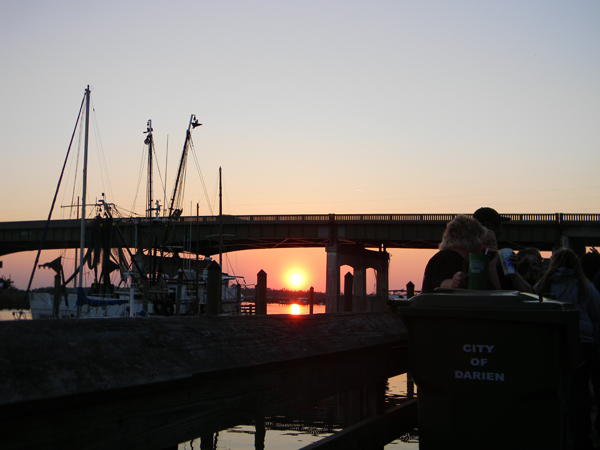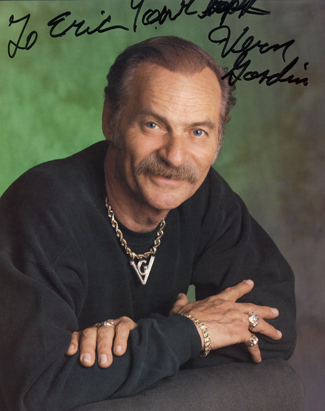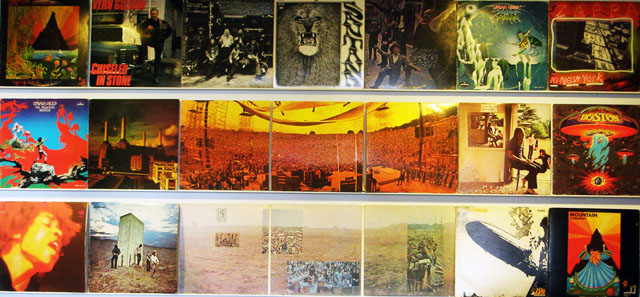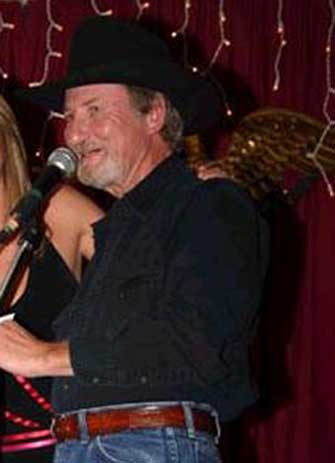inspiration
Need help with your vocals? Check out Vocal Coach Extraordinaire, Judy Rodman
I’ve wanted to take a step with my vocal abilities for some time now and this year seemed like a good time to do it. A few months ago I dug out an old vocal method book, “The Rock ‘n Roll Singer’s Survival Guide” by Mark Baxter, a vocal coach I had studied with in Boston in the late 90s. After digging into it for a few weeks I came across one of the books many great recommendations – the importance of taking voice lessons from a vocal coach – and that was all I needed for encouragement.
I had recently heard some great things about Nashville-based vocal coach, Judy Rodman, so I decided to give her a try. In early March I took my first lesson at her home studio, a one hour session during which we covered a lot of ground. After discussing my current musical activities and goals, she began the lesson by demonstrating some “mechanics” about the human voice, partially aided by the use of models and diagrams. Then she took me through some warm-ups, all the while listening and observing my “habits.” Next, she had me sing a song of my choosing, and this is when it became even more apparent that she had a truly unique approach to vocal training.
After strapping on my guitar, she had me sing into a mic that was plugged into a couple of floor monitors to emulate a live gig. I don’t think I sang more than a verse before she told me to stop so she could address some issues. Apparently, years of guitar playing, combined with other “intellectual pursuits” had allowed me to develop some bad posture, posture that was restricting my vocal abilities. To begin correcting this, she had me sing while standing with my head and one heal up against the wall, while allowing my shoulders and back to be loose.
She also introduced some other concepts to improve my vocal “path.” One I found particularly enlightening was to pick an object or spot on the wall and imagine that it’s a person to whom I am telling a story. Another was to pretend I’m singing to a deaf person, to cause a deeper articulation of the words and phrases. Yet still another was to raise my eyebrows when I sing, as this expands “the cave” and will allow for a more resonant sound. By the time I left the lesson I was not only inspired to go home and practice, I had made an immediate and noticeable improvement.
Since that day I’ve taken a half-hour lesson every other week and have made great strides, and I actually look forward to practicing! Like any great music teacher or coach, Judy has a gift for custom tailoring each student’s approach and practice regimen; she quickly honed in on my problems and came up with the appropriate exercises and concepts to correct them, each lesson introducing new ones. If you live in middle Tennessee (or anywhere for that matter, as Judy also gives lessons over the phone or via Skype), and are in need of some vocal coaching, I highly recommend Judy, she is truly a vocal coach extraordinaire!
Well that’s it for today; it’s time to go sing!
The Benefits of Having, and Being a Mentor
“Teaching is the profession that teaches all the other professions.” – Author Unknown
When I first arrived in Nashville in 2002, I realized that to succeed in this massive and confusing music industry I would be faced with great challenges in the months and years ahead. I was fortunate, however, as I had a good friend in the industry – one who had already paid his dues and found some success here, and he helped to illuminate a path that worked for me. He was my Nashville mentor.
“You may be only one person in this world, but to one person at one time, you are the world.” – Anonymous
He didn’t consider himself a Mentor, or teacher, he was simply a good friend helping another friend. But I was clueless about how this music industry worked, so to me he was a lifeline of information and inspiration. He knew I needed this guidance and direction, and for whatever reason, he decided to invest in my future. He went out of his way to help me on many occasions – advice-filled phone calls, one-on-one guitar lessons, trips to the music store to check out new gear, introductions to friends in the business, he even gave me an electric guitar.
“The dream begins with a teacher who believes in you, who tugs and pushes and leads you to the next plateau, sometimes poking you with a sharp stick called ‘truth.’ “- Dan Rather
What he offered that probably helped me the most was insight and advice. He had already been working in this town for 10 years at this point in time, so he had a great perspective of a much larger view of the music community than one could see quickly. His accumulated wisdom also allowed him to see my strengths and weaknesses. After one embarrassing moment in a Nashville nightclub, one where I sat in and played a style in which I was in over my head, he was compassionate, but brutally honest.
“You might want to stay away from downtown for a little while; you need some more wood shedding.”
As much as I didn’t want to hear this, I knew it was the truth and I knew that there was more work to be done. Over time, I improved my weaknesses, largely thanks to his advice and suggestions, and returned to the in-town nightclub scene better prepared. I eventually wound up playing as a sideman on tours, recording on songwriter demos, etc. and I have been fortunate to wind up in the category of musicians who find a way to survive Nashville. If it weren’t for the great help I was given early on by this generous human being, who knows how it all would have turned out.
“A teacher affects eternity; he can never tell where his influence stops.” – Henry Brooks Adams
Years before I moved to Nashville I was a guitar teacher in New England. I taught 30 to 40 students privately per week. I did my best to help all of them, but some were more receptive than others, and for many my teaching went beyond the half-hour lesson – helping them pick out instruments, inviting them to sit in with my band, phone conversations – I gave more than I was expected to because it felt like the right thing to do.
Now, 10 years later, I have learned that one of these students is a guitar teacher himself and plays in a successful nightclub band as well. Another one of these students that received some extra “mentoring” went on to graduate from the Berklee College of Music and is earning his living as a touring musician. And still another former student, one who earns his living in the corporate world, continues to enjoy the healing power of music in his private life.
“There are two way to live your life. One as though nothing is a miracle, the other as though everything is a miracle.” – Albert Einstein
I too believe that life is a miracle and shouldn’t be taken for granted. Long before I had my Nashville mentoring, there were several other “mentor-like” figures in my life. These people acted in a selfless way, reserving judgment, and accepting me as I was, while doing many great things to help me become a better person. My wife, Kelly is one of these great people. To this day, she continues to help me shape my life in a way that makes me better, while still accepting me for who I am.
At this point of my life I am glad to be in a position where I can help some others along the way. For many, the Nashville dream is a tough row to hoe, and the book I just wrote is designed to help some of these struggling folks – kind of my way of paying it forward. And when someone asks me for advice I always do my best to offer insight that will really help that person.
So I urge you to take a minute and ask yourself a couple of questions – Who in your life is looking to you for answers? How can you help them on their path? If you put your best foot forward and help a few folks along the way, if nothing else, you’ll sleep better at night knowing that you did your small part to make the world a better place.
“Together we can change the world, one good deed at a time.” – Pay it Forwarders everywhere
As some of you may know, and for those of you who don’t know, I have just released my book “The Nashville Musician’s Survival Guide.” This street-level perspective of the music-related jobs in the Nashville music industry is now available in print and eBook versions. To purchase your own copy, follow this link.
“Blessing of the Fleet” with Rhett Akins in Darien, Georgia
After several days of heavy rain had inundated the coastal town of Darien, Georgia, I was more than pleased to view a beautiful sunny day out the window when I first walked to the front lounge of our bus last Friday morning. All week long I had feared a washout for our 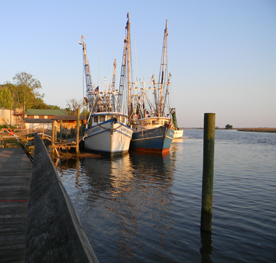 concert at the annual “Blessing of the Fleet” in the picturesque fishing community of Darien, so it was comforting to know that the weather would be on our side for this one. A little while later we landed our bus at the concert site – a homey little park lined with majestic old trees covered in Spanish moss on one side; and a long, riverside dock lined with fishing boats that abutted the river inlet that led to the Atlantic Ocean on the other.
concert at the annual “Blessing of the Fleet” in the picturesque fishing community of Darien, so it was comforting to know that the weather would be on our side for this one. A little while later we landed our bus at the concert site – a homey little park lined with majestic old trees covered in Spanish moss on one side; and a long, riverside dock lined with fishing boats that abutted the river inlet that led to the Atlantic Ocean on the other.
Darien, Georgia, is a town right of southern folklore, and retains a unique feeling and charm despite its rocky history. Built right on the Altamaha River in 1736 by Scottish Highlanders, it was a historic battleground during the Civil War where black troops saw some of their first action. On June 11, 1863, the town was looted and “burned to the ground” by Federal Troops, an act that would later be referred to as a “Satanic Action” by Colonel Robert Gould Shaw, the reluctant commander whose troops committed the act. Darien was rebuilt after the Civil War ended, and would eventually become a fishing village, with wild Georgia shrimp becoming a major part of the local community’s livelihood.
Of course we would be fortunate to experience some of this fine local seafood firsthand shortly after sound check when we were treated to a dinner at “Skippers Fish Camp,” a cozy little restaurant that sat right on the edge of the river. After dinner and a little downtime, the sun began to set and the park began to come alive with activity. As the warmth of the sun began to fade, an amazing sunset briefly 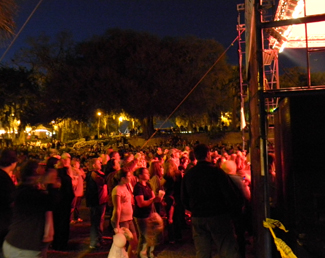 appeared over the nearby bridge overpass, and the sky became a deep red until the sun disappeared beneath the horizon. Darkness now upon us, the grounds began to quickly fill with locals and concertgoers while a local band took the stage to heat things up for Rhett’s show.
appeared over the nearby bridge overpass, and the sky became a deep red until the sun disappeared beneath the horizon. Darkness now upon us, the grounds began to quickly fill with locals and concertgoers while a local band took the stage to heat things up for Rhett’s show.
A little while later it was show-time and the park was filled to capacity. Concertgoers covered every visible square inch of grass in the park, lined the hill to our right, and filled the docks to our left. Meanwhile others enjoyed the show while hanging out on the dozens of boats that were tied to the dock. Rhett was in great form and ran through his set of radio friendly hits, a few renditions of his favorite classics, and our own versions of some of his most recent songwriting masterpieces – “The Shape I’m in” recently cut by Joe Nichols being one of the standouts.
The crowd on this warm and vibrant night was festive and on our side from the start. They were quite vocal too, cheering loudly after every song, and singing along with many. When the main part of the show ended; the strong, roaring applause warranted an encore, and we returned to the stage for a few more. By the time we left the stage for the last time on this evening, we had played an hour and 45 minute set, and fun was truly had by all.
minute set, and fun was truly had by all.
I find it inspiring to see that Rhett, despite having such recent, major success as a full-time songwriter, still loves to perform live. Regardless of the kind of day he is having, when he hits the stage, he gives his all to the performance at hand, and to the people who came to see him. This kind of energy and focus makes it easy for the rest of us to play with the same kind of fervor. A small town like Darien, Georgia, with a population of around 2000, doesn’t have a festival or concert on this level very often, and their appreciation of our performance was both genuine, and evident. By the time we were heading back to Nashville, we all had a good feeling about our short stay in Darien. The town had been a wonderful host, and we were happy to help this community feel good on this day.
In the world of the touring musician, years of playing live shows can render concerts to be a bit of a blur, with one show blending into the next. But all of these shows do matter – each concert can, and should be a special event. When we visit a small community like Darien for a brief moment as this, it can have a lasting impact on people. This was also the case when we performed in the small town of Winchester, Tennessee, a few weeks ago. Even though the crowd wasn’t particularly large in Winchester, maybe two or three hundred folks in a local high school gym, everyone in attendance that night left with a smile. When you give your all to these folks, you might to help create a special memory that could last a lifetime, at least for some. I believe that this sense of community and goodwill is at the core of many a great performer. The great feeling we got at the show from the people of Darien last Friday is why many of us musicians love what we do, and this helps make being a musician a noble and worthy endeavor. Thanks Darien!
My Band Is like Ice Cream – The Perks of Living Nashville
Last Saturday saw another outing of my new trio when we played to another standing room only, sold-out show at the Fillin’ Station in Kingston Springs, TN and boy was it fun! Okay, maybe it wasn’t standing room only, but I always wanted to say that, and besides, we played like it was a full house. It was another cold, wintry Saturday night in middle Tennessee and we had just received our seventh snow storm of the season a few days prior (it’s already snowed more times this winter than it had in the previous seven since I’ve been here). So we were feeling a little housebound and it was good to get out and play.
“It’s like eating ice cream.” That’s how Mike Chapman, my good friend and bassist in this project, described our band and the gig after the show – it’s as fun as fun can ever be, and it comes without any real purpose or pretense other than to simply be fun. At this point of my career, and life for that matter, outings with this trio are perhaps the most enjoyable experiences I ever have when it comes to playing music. Not that my other musical activities and work aren’t fun, I have found a way to enjoy just about every musical situation at this point, but many of them are on somebody else’s dime, and that almost always creates a whole other mindset and set of expectations.
Take my job with Rhett Akins for example. It’s a great job, we go on the road couple of times a month, I get to hang out with my friends, play some great shows, and get driven around the country on fancy tour buses. Of course I also have to advance shows, deal with event coordinators, production companies, etc. – there’s a lot of responsibility with my job and that can often be accompanied by stress.
The same applies to working on songwriter demos, another one of the hats I wear. Building songs in my home studio, recording drums, guitar tracks, vocals – while these are still dynamic and challenging musical activities, they are on someone else’s dime, therefore, I must work quickly and efficiently and put aside my creative differences in the name of pleasing my clients – the customer is always right. But it’s still all music related work, and that’s great, it’s what I set out to do a long time ago. Not to mention, I’m making my living doing something I love.
There is one thing that I have noticed after what is now more than two decades of working in the music business full-time, it’s called desensitization. After a lifetime of musical activity I have logged many thousands of hours on my instrument, played over 3000 live shows, and worked on countless studio recordings. I’ve also listened to thousands of recordings, as so many of us have. This oversaturation (for lack of a better word) of musical activity can take away some of that special spark that we had in our younger years. I can never again hear the music of Jimi Hendrix or the Allman Brothers for the first time again. Not to mention the power of youth, as a friend of mine once said “There’s nothing like a teenager playing music, they always play with reckless abandon.”
So now I’m all grown up and playing for a living and, while I am thrilled about how it all worked out, I still long for that kind of fix that I used to get daily from music in my younger years. That’s where my trio comes into play. My good friend Mike Chapman is a legend in Nashville, one of the finest bass players you’ll ever meet, and my experiences in the music business to date are only a small fraction of what he has experienced. The same is true of my other compadre in this project, friend and drummer extraordinaire Fran Breen. At one point Fran was so busy in the music world that he turned down an opportunity to tour with Van Morrison.
After nine years of playing and working in Nashville I have come to know these fine players as friends, in addition to working with them on different gigs over the years, and this is perhaps one of the biggest perks of living in Nashville. I wasn’t going to meet Mike and Fran in my native New England. And it turns out we share some common ground. Sometimes they need a musical “fix” too, and perhaps that is why they are enjoying this trio project as much as I am. Literally every time we finish playing one of these gigs I find myself excitedly awaiting the arrival of the next one.
Touring the country, playing on big stages, working on recording projects, that’s all good and well. I’ve worked hard to accomplish everything I have and am thankful that it has all worked out. But for me and the guys, sometimes we just want a little ice cream.
Pick a Night, Book a Gig, and Go Make Some Music With Your Buddies
The ever churning music scene of Nashville can be kind of quirky. Even though it has downsized a bit since its heyday of the booming 90s, it’s still a constant flurry of activity, with thousands of musicians of all levels and backgrounds continually searching and on the move. Searching for gigs, connections, opportunities, and quite often, searching for a pathway to a success that has yet to be defined. We’re all on the hunt for something more.
That’s how I felt when I first moved to Nashville, nearly 10 years ago. I didn’t really know exactly what I wanted to do here; I just knew I wanted to accomplish more than I had in my previous life as a nightclub performer and music teacher in New England. I can remember the sense of impatience and anxiety I felt during that first year, the endless thirst for musical activity – no gig was too big or small.
As a fresh arrival in 2002, I knew very little about how this place worked and relied on my friend and mentor “D” to fill in the blanks. “If you are looking for paying gigs, the country scene is where it’s at. It’s pretty much a freelance scene, but that’s where you’ll make the connections you’ll need to survive. Just get out there and start hitting the clubs and get to know people, sit-in whenever you can. But whatever you do, don’t join a band, bands starve.” All sound advice coming from a successful player who had already been here for 10 years.
“I’m really into blues and rock. Is there a scene here for that? I asked innocently. “There is, but you’re going to go broke if you only play that stuff here” was his reply “Plus you’ll get pigeonholed”. “Well if all this activity is basically hired guns, how do you just have a band for fun?” I asked, not wanting to accept this new fate. His solution was so simple – “After you get to know and become friends with some good players, just pick a night, book a gig, and go make some music with your buddies.”
While his advice made a lot of sense, it would take years for me to fully realize this new potential. I began digging in to the scene, networking, sitting in, and this approach worked. I played hundreds of gigs around the city during those first couple of years – Broadway gigs, Printers Alley gigs, gigs on the outskirts, showcases – you name it I played it. These gigs eventually lead to touring work and a couple of years later I began playing on songwriter demos too.
Now it’s 2011 and I’ve been here for nearly 10 years. I can’t believe how fast time flies, the last decade was a blur of endless activity. I didn’t move to Nashville to become a superstar or a songwriter, I came here to work as a player, and I’ve succeeded in that endeavor. I make my living (or the bulk of it) as a freelance musician, something I was not able to do prior to my Nashville days.
But something has still been missing and I just recently figured out what it was. I haven’t been playing music enough for the sheer joy of it. Nearly all of my music career dreams have come true. I’ve played in every state in the lower 48, Canada, parts of Europe; 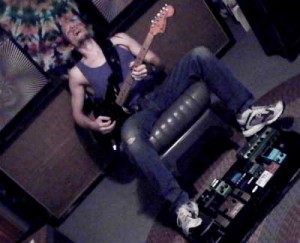 I’ve learned how to play guitar on recording sessions; I’m good friends with some of the finest musicians on the planet; I’m earning a living from my craft. But where’s the self-expression within all of this? Don’t get me wrong, there’s plenty of good music involved in what I do. But a lot of the music I do for pay is the result of somebody else’s expression, and at times, lacking a personal connection to me.
I’ve learned how to play guitar on recording sessions; I’m good friends with some of the finest musicians on the planet; I’m earning a living from my craft. But where’s the self-expression within all of this? Don’t get me wrong, there’s plenty of good music involved in what I do. But a lot of the music I do for pay is the result of somebody else’s expression, and at times, lacking a personal connection to me.
So last fall I finally decided it was time to follow ol’ Ds advice – “Pick a night, book a gig, and go make some music with your buddies.” I’m not sure if it’s just because I’m getting a little older and my priorities are changing, or because working as a freelance musician allows you to be a part of everything, without actually belonging to anything, but making some music for the soul on a regular basis with my friends is now a big priority for me.
While I’m making my living as a hired gun within the country side of this town, I have a new found love for my side project “Endless Boogie”, a band project that has no goal other than to simply provide me and my buddies with a night or two a month of self-expression through fun music. My good friends Fran Breen, drummer extraordinaire originally from Ireland (with the accent to prove it), and Mike Chapman, bad-ass bassist and member of Garth Brooks’ famed session band, the G-Men, were the first players I called for the gig. Even though they’ve both been here far longer than I, perhaps their love of just getting out there and playing is even more telling about working as a career freelance musician long-term.
A few months ago, when we did one of our first gigs at the Fillin’ Station in Kingston Springs, another player that new Mike walked in mid-set. He seemed surprised to see Mike on this “outside the microscope” gig and asked “What are YOU doing here?” Mike’s reply was honest and telling – “I’m playing.”
To me, this simple exchange says it all. What should have been obvious to the other fellow wasn’t. Not every gig has to be about money, prestige, or opportunity. While my buddies and I know the importance of a little music for the soul, it is easy to understand how a lifetime of working in the music industry can change that.
So what are you waiting for?
“Pick a night, book a gig, and go make some music with your buddies.”
Endless Boogie will be playing tonight, Tuesday, January 18 at the 12 South Tap Room, located next to Mafioso’s on 12th Avenue South, Nashville, TN. The show starts at 9 PM and we will be playing some of our favorites from Hendrix, Allmans, Santana, Muddy, and Miles, plus a few of our own. The tap room is one of the coolest “non-Nashville” bars in Nashville and has a great menu, friendly staff, a whole bunch of fancy beers on tap, and never a cover.
12 South Tap Room
2318 12th Ave South
Nashville, TN 37204
615-463-7552
Vern’s Coming over for Dinner
Having grown up in the Northeast on a diet of rock and blues, and listening to very little country music prior to moving to Nashville, the name Vern Gosdin was not one I was familiar with. So when I got a late-night phone call in the fall of 2002 about playing a show with him, my initial reaction may have been somewhat muted. The call came from a producer named Kenny whom I had met a few weeks earlier at my house gig at Libby’s. He described the show as being a one-off with Vern to somewhere in Kentucky and asked me if I could put together and rehearse a band. Hungry for work, I accepted the show and began making calls to recruit players the next day.
One of the first calls I made was to D for some advice. “Vern Gosdin! Do you realize who he is?” he replied in amazement. “Well I know he had some success a few years back.” I replied unknowingly. “They call him ‘the voice’ of country. It’s like getting a gig with Merle Haggard. I’ve been here 10 years and I’ve never got to play with him.” a hint of jealousy riddled his voice. “He’s a real legend. This will be a great experience for you.”
D’s excited reaction prompted a little further investigation, which of course revealed that ole Vern was sure enough a bona fide superstar. 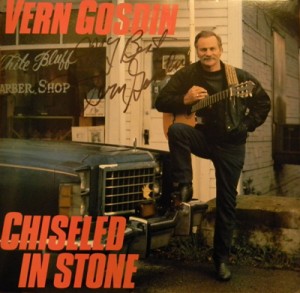 In a career that spanned over four decades, he had recorded somewhere around 20 albums yielding roughly the same number of top 10 hits. Now I began to get a little nervous. Always up for a good challenge, I began calling some of the better players I had met over the past couple of months. The role of a bandleader in Nashville, I quickly learned, puts one in the unique position of being able to offer work to other players, and in Nashville, work is something there is never enough of. Once people know you’re a bandleader, phone calls start getting returned with more expediency and other musicians seem to have more interest in you when you walk into a room (of course when things go wrong, you will be the first one everyone looks to).
In a career that spanned over four decades, he had recorded somewhere around 20 albums yielding roughly the same number of top 10 hits. Now I began to get a little nervous. Always up for a good challenge, I began calling some of the better players I had met over the past couple of months. The role of a bandleader in Nashville, I quickly learned, puts one in the unique position of being able to offer work to other players, and in Nashville, work is something there is never enough of. Once people know you’re a bandleader, phone calls start getting returned with more expediency and other musicians seem to have more interest in you when you walk into a room (of course when things go wrong, you will be the first one everyone looks to).
Within a few days I had put together a five piece band of the best players I could find consisting of Chip on drums, Sid on bass, Mark on keys, Brian on steel, and me on guitar. I obtained recordings of Vern’s material from his assistant, charted the songs, and dispersed these materials to the other players. As the show date grew closer, Vern’s assistant notified me that one rehearsal would be required the week of the show. I also learned that we would need to provide transportation for Vern to and from the rehearsal, as he no longer drove.
On the day of the rehearsal, a couple of the band guys that lived close to Vern’s home near Opryland stopped by to pick him up. My only encounter with Vern up to this point had been one brief phone call, and our discussion was so brief that I still had yet to gain a real sense of the man. Over the weeks leading up to this rehearsal I had begun hearing a few horror stories about Vern. Apparently, he had a penchant for firing drummers, at least according to the rumors, and had a reputation of being quite “ornery” from time to time. He had even been known to pull a gun on a few unsuspecting musicians over the years, supposedly.
This was not the Vern that I would meet later on that night. For into my house walked one of the kindest, sweetest fellows you could ever meet. He had a sense of humor too, as we all learned when I was the butt of his first joke on this night. “How are you feeling today?” he asked. “Great, thanks.” I replied. “Well it’s a good thing that you don’t feel like you look.” he responded as muted chuckles engulfed the room. This kind of dry humor was apparently typical for Vern as I would later learn.
I had rearranged my basement music room to accommodate this band rehearsal, and the limited space was quickly filled with gear and bodies. Once the gear was up and running, our rehearsal began. Another thing that I would later learn was that Vern had suffered a stroke in recent years, and this often impeded his communicative ability. Several songs were stopped short when he needed to convey different musical ideas – signature licks, key changes, intros, endings – he couldn’t always communicate exactly what he was thinking, but it became obvious that he knew his music well, and that he knew when something wasn’t being played right.
We did our best to make his songs feel right to him, and although the mood of this night was fairly upbeat, the rehearsal wound up being shorter than optimum for us, and longer than optimum for Vern. He was getting tired and called the night before we could get through all of the material, rendering it essential that the band be extra prepared for the gig.
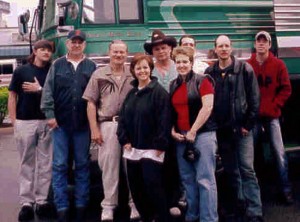 A few days later we all met at Fiddlers Inn near Opryland and hopped on a bus bound for a show in Kentucky. We rode the bus for a few hours before arriving at our gig where we loaded in, sound checked, and ran a few tunes. We did two shows that night in a midsized venue that was reminiscent of an old church out of yesteryear. The two sets were night and day by comparison, the first being quite bad as Vern was feeling a bit under the weather. We did our best to hold it together behind him, but it was a struggle. After a long break, during which Vern got some food and rest, we hit the stage again for our second and final show. Vern, now feeling much better, performed brilliantly. His sweet, resonant voice conveying a wide spectrum of emotions, I could now hear why he had been deemed “the voice” by so many. This strong vocal performance made it effortless for the band to follow him – We were on! The show ended to a strong applause and a room full of smiles. We had done what we had set out to do, and were on our way home.
A few days later we all met at Fiddlers Inn near Opryland and hopped on a bus bound for a show in Kentucky. We rode the bus for a few hours before arriving at our gig where we loaded in, sound checked, and ran a few tunes. We did two shows that night in a midsized venue that was reminiscent of an old church out of yesteryear. The two sets were night and day by comparison, the first being quite bad as Vern was feeling a bit under the weather. We did our best to hold it together behind him, but it was a struggle. After a long break, during which Vern got some food and rest, we hit the stage again for our second and final show. Vern, now feeling much better, performed brilliantly. His sweet, resonant voice conveying a wide spectrum of emotions, I could now hear why he had been deemed “the voice” by so many. This strong vocal performance made it effortless for the band to follow him – We were on! The show ended to a strong applause and a room full of smiles. We had done what we had set out to do, and were on our way home.
Over the next year I played a handful of dates with Vern, and remained as bandleader and guitarist through my tenure with him. About a year later I started working on a busy tour and could no longer do Vern’s dates. But during that time we had become good friends, and years later he still called me from time to time to say hi. He had a handful of jokes that weren’t particularly funny, that somehow made me laugh anyway. I would be walking around a supermarket or Wal-Mart and the phone would ring – “Hey son, it’s Vern, I’ve got to ask you something. Do you hear that sound?” “What is it?” I would ask. “It’s the sound of my boot hittin’ your ass!”
He would literally start out every conversation with a joke like this, and I would laugh every single time. Around 2008 I was fortunate enough to have a schedule that would allow me to do a few more shows with him. Then I heard the sad news in April of 2009 that he had died from complications due to another stroke. “The Voice” of country may have moved on, but his musical legacy remains a timeless testament to his greatness. And the Vern that I grew to know and love will always hold a special place in my heart. Even though I know he won’t be calling any time soon, I still keep his number in my cell phone, just in case.
Top 25 Greatest Rock Albums of All-Time
Just for fun, I thought I would make a list of what I consider the top 25 greatest rock albums of all time. Growing up in the 70s and 80s, this music was the backdrop of my life, and I listened to most of it on vinyl, the medium in which I still prefer most today. In fact, I still own most of these albums and listen to many of them regularly. First of all, this was a hard list to compile. I have so many favorites and it was hard to whittle it down to just 25. What makes a great album? I think it comes down to the songs, performances, production, staying power, and popularity. Of course, excluding popularity, all of these criteria are a matter of opinion.
The following albums, in my mind, are all gems. They are all outstanding collections of great songs performed by brilliant musicians, and deliver a monumental sonic imprint to the universe. You might notice, barring a few exceptions, that most of this music was recorded before 1980. Once again, just my opinion, but I think that the majority of all great rock music was recorded during the 60s and 70s. Although some great rock records were made during the 80s, advances in recording techniques led to the tendency to “overproduce” which unfortunately dated many recordings from that period. By the 90s, the rock ‘n roll party was pretty much over. While grunge and alternative did have some elements of rock, the feel-good factor (along with guitar solos) seemed to be missing.
So here it is. The music that rocked the masses, the songs that inspired so many of us to grow, the sounds that made me want to learn guitar, the records I cranked full blast on my bedroom stereo after school before the parents got home, the music I listened to in my car while cruising the beach with my buddies late at night, the songs that helped solve many of life’s problems, the music of my generation and the generation just before – The greatest albums by the greatest bands from the golden era of rock!
|
1. |
Boston – Boston |
|
2. |
Van Halen – Van Halen |
|
3. |
Are You Experienced – Jimi Hendrix |
|
4. |
Led Zeppelin IV (Zoso) – Led Zeppelin |
|
5. |
Dark Side of the Moon – Pink Floyd |
|
6. |
Electricladyland – Jimi Hendrix |
|
7. |
At Fillmore East – Allman Brothers |
|
8. |
Led Zeppelin I – Led Zeppelin |
|
9. |
Van Halen – Fair Warning |
|
10. |
Montrose – Montrose (Sammy Hagar’s first band circa 1972) |
|
11. |
Bad Company – Bad Company |
|
12. |
Abraxas – Santana |
|
13. |
Rubber Soul – The Beatles |
|
14. |
Band of Gypsies – Jimi Hendrix |
|
15. |
Moving Pictures – Rush |
|
16. |
Revolver – The Beatles |
|
17. |
Whitesnake – Whitesnake |
|
18. |
Back in Black – ACDC |
|
19. |
Wheels of Fire – Cream |
|
20. |
Doctor Feelgood – Motley Crue |
|
21. |
Machine Head – Deep Purple |
|
22. |
Woodstock Soundtrack |
|
23. |
Get Your Wings – Aerosmith |
|
24. |
Van Halen II – Van Halen |
|
25. |
Who’s Next – The Who |
What’s your take? Do you think all of these albums belong at the top of the pile? Do you think any are missing? What are your favorites? I’d love to hear your thoughts and comments.
Live at Libby’s: Country Music Basic Training: Part 2
It was the fall of 2002, I’d been in Nashville for a few months, and had just landed a weekend house gig at Libby’s Steakhouse in Kentucky, a great country music venue in which I could hone my chops. I was spending most of my days selling stuff on eBay, driving around to pawn shops looking for more stuff to sell on eBay, and practicing, practicing, practicing. My recent debacles on Broadway and at a recording studio on Music Row revealed to me that I had a lot of work to do, and this prompted me to get really organized about my practice regimen. While I was still going to downtown Nashville one or two nights a week to network, making the Tuesday night jam at the Fiddle and Steel a regular stop, these weekly outings on the town mainly served to build connections, not so much to sit-in. I needed to improve my country chops quite a bit before I would be comfortable enough to put myself out there on the chopping block again.
So every Friday around dinnertime I would set out for Daysville, Kentucky, sometimes accompanied by my wife, sometimes not. Each weekend outing at Libby’s would introduce me to new material, and I would obtain recordings of these songs to work on over the following week. In addition to learning these songs and other standards I heard around town, I was digging in hard to my technique in general, practicing country rhythm, chicken pickin’, Western swing and, to avoid losing any ground, a little rock, blues, and jazz as well. A friend of mine had given me a CD of some old-school country tele players, Bill Kirchen and Redd Volkaert aka the Twang Bangers, and I listened to and tried to mimic their lines, style, and feel. I also did the same with recordings of Alan Jackson that featured Brent Mason.
To create a challenging way to practice all these new techniques, I burned a mix CD comprised of several country, western swing, and bluegrass tunes. The 11 song guitar workout CD covered nine different keys, a variety of tempos, and several different feels (straight eighths, swing, etc).
|
Key |
Song |
Tempo/Feel |
|
D |
Goodhearted Woman |
slow eighths |
|
E |
Folsom Prison Blues |
medium eighths |
|
F |
Truck Drivin’ Man |
fast eighths |
|
Bb |
Chase Each Other Round the Room |
medium swing |
|
G |
How Mountain Girls Can Love |
fast eighths |
|
Ab |
Workingman Blues |
medium eighths |
|
A |
Poultry in Motion |
medium eighths |
|
G |
She Loves Anything |
fast eighths |
|
Bb |
White Lightning |
medium eighths |
|
B |
I Don’t Think Hank Done It This Way |
medium eighths (Waylon Stomp) |
|
F |
Quit Feelin’ Sorry |
medium swing |
Prior to moving to Nashville, I had never used the chicken pickin’ technique, and as it was the weakest link in my chain, it was the technique I practiced the most. This technique is a hybrid way of picking the strings on a guitar. Holding the pic between your thumb and first finger,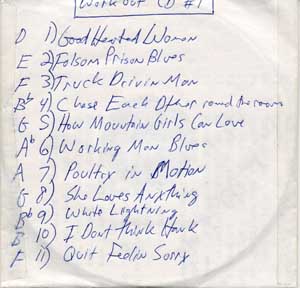 you alternate between picking the strings with the pic, and plucking the strings with either the third finger or second and third finger. This is also commonly referred to as “the claw”. Both rhythm and lead lines can be played with this technique, and practicing along with this CD, without pausing in between songs, somewhat emulated the pace and variations that might happen while performing with a live band.
you alternate between picking the strings with the pic, and plucking the strings with either the third finger or second and third finger. This is also commonly referred to as “the claw”. Both rhythm and lead lines can be played with this technique, and practicing along with this CD, without pausing in between songs, somewhat emulated the pace and variations that might happen while performing with a live band.
Every day I worked diligently in my basement music room, practicing country music standards and technique. I would practice until my right hand felt like it was falling off, or until I felt like throwing my guitar through the window, always managing to stop just prior to either thing happening. My improvement was slow, but steady, and gradually the other players at my weekend gig began to notice. I would practice and do the eBay thing all week long, go downtown to network for a couple of evenings, and head off to Kentucky for the weekends.
Libby’s was a family kind of place with a relaxed atmosphere and served no alcohol. But this didn’t stop some of the band members, me occasionally included, from sneaking a beer or two out back before the shows and during breaks. Hey, we were playing country music at a steakhouse in Kentucky; I don’t think Merle or Hank would disapprove. In all fairness to Libby, who was trying to run this show as professionally as he could, everyone seemed to keep the Budweiser buzz to a dull roar, always making a strong performance the priority (okay, maybe a few times the steel player got a little too loopy and hacked a little). But Budweiser or not, we had a great time. The players and the guest singers always gave it their all, and the crowd, no matter how big or small, always showed appreciation.
I worked at Libby’s for about four or five months through that fall and winter and, in hindsight, it was the best thing that could have happened to me at that point in time. By early spring I felt ready to dig in full bore to the country scene in Nashville and gave my notice. Libby understood why I had to leave, thanked me for my time, and wished me luck.
A couple of years later I was gigging at Tootsies and ran into one of the girls who had been a regular guest singer at Libby’s. Sadly, she informed me that Libby had just passed away at the age of 65. We reminisced about what a great time we always had back in the day, and how much he had cared about music and people. Libby was a sweet old guy and had treated me with the utmost respect. He gave me a chance when I needed it. I will always look back on those days with fondness, and will be forever grateful to have known Libby Knight.
D – Goodhearted Woman slow eighths
E – Folsom Prison Blues medium eighths
F – Truck Drivin’ Man fast eighths
Bb – Chase Each Other Round the Room medium swing
G – How Mountain Girls Can Love fast eighths
Ab – Workingman Blues medium eighths
A – Poultry in Motion medium eighths
G – She Loves Anything fast eighths
Bb – White Lightning medium eighths
B – I Don’t Think Hank Done It This Way medium eighths (Waylon Stomp)
F – Quit Feelin’ Sorry medium swing
Losing Your Hair? Balding in the Middle? Learn How to Just Let It Go!
In this day and age, looking the part is often just as important as playing the parts for many professional musicians. This is equally important for those who have not yet achieved a career in music, but are working towards one. While being proficient on your instrument and possessing good social and networking skills are obviously important, in the world of live music performance, your appearance can sometimes be a deciding factor on getting the gig.
It’s easy to find the right clothes, and it’s a well-known fact that working out and having a good physique will make those close “hang well” on your frame. But for some (men especially), the hairstyle, or lack thereof, can be a dealbreaker. I’m not talking about the 20 something’s with the $300 spiky mod looking haircuts. As much as I don’t care for that look, they are not the biggest offenders of the modern day hair wars. In my opinion, it’s the guys who are losing their hair but living in denial that really need to rethink the current state of the top of their heads.
It’s no secret that many of us have lost, are losing, or will lose much our hair over the course of our lives. For some it begins as early as late teens or early 20s, for others it might not happen until they’re in their 30s or 40s, while others manage to hold on to most of their mop 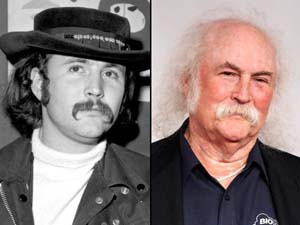 until old age. Sometimes this hair loss happens rapidly, over several months or a couple of years and sometimes it can occur very slowly and gradually over decades. Some just get a little bald patch near the back of our head, while others are stricken with more of that dreaded “parting of the seas” look.
until old age. Sometimes this hair loss happens rapidly, over several months or a couple of years and sometimes it can occur very slowly and gradually over decades. Some just get a little bald patch near the back of our head, while others are stricken with more of that dreaded “parting of the seas” look.
Many musicians take great pride in their hair, often choosing a style that works for them in their younger years and sticking with that as they age. Some will sport short to medium length do’s while others choose to wear it long, anywhere from the mid-60s Beatles look all the way to full-blown hippie length. But if you are in the unlucky category that many of us fall into, that being the permanent hair loss club, these styles will begin to create a different effect and take on new meanings as these 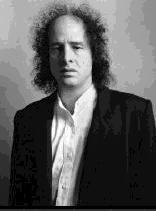 hair follicles slowly begin to vanish forever.
hair follicles slowly begin to vanish forever.
Are you the guy with the comb-over? If you are, you’re not fooling anyone. Maybe you’re the guy that had hair like Greg Allman when you were in your 20s. Oh, how the girls loved it back then. But how are you being perceived now when that part between you’re neatly combed and blowdried shoulder length blond hair rival’s the San Andrea’s fault? Probably more like the friendly lion in the wonderful Wizard of Oz. There’s always a baseball cap. But eventually, as people notice over time that you’re never seen without one, it will become a dead giveaway that you’re hiding something. You could always grow a beard and start wearing a cowboy hat, sporting your version of some kind of half assed Travis Tritt look, but that’s a pretty big commitment, and not that hip anyway. Not to mention, when you commit to the whole hat thing, what happens when you go swimming? What happens the first time you sleep with a new girlfriend?
Face it, none of this works. Yet, somehow, we see people that look like this all the time. Well I have some 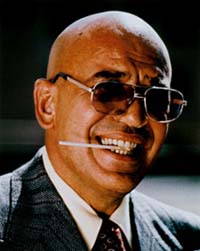 great news for all of you who are fighting this futile “battle of the bald”. There is a way out, and I’m not talking about hair transplants, wigs, or toupe’s. Just let it go. That’s right, shave it off. Bald is beautiful, baby. For proof, look no further than Telly Savalas or Bruce Willis.
great news for all of you who are fighting this futile “battle of the bald”. There is a way out, and I’m not talking about hair transplants, wigs, or toupe’s. Just let it go. That’s right, shave it off. Bald is beautiful, baby. For proof, look no further than Telly Savalas or Bruce Willis.
Growing up, I had a thick head of hair, and by the time I was 15 had already experimented with growing it long. I went in and out of short hair and long hair mode for a few years before going all out in the late 80s, when I began sporting a full-blown Richard Marx style mullet. Of course, at that moment in time that style was in, so spending 20 minutes with a can of moose and a blow dryer to get ready to go out for the night, or gig, was completely natural. Of course I kept this “helmet do” well into the 90s, long after it had become unfashionable. Then, in my mid-20s, it all started going quite badly.
Over a period of about a year, I lost most of the hair in the middle of my head. It happened so quickly that I hardly even noticed at first. But then when my girlfriend started telling me that I was beginning to look like Michael Bolton, I knew something was wrong. On a bad day, my massive bouffant do, once reminiscent of Peter Frampton’s early look, began to look more like that of the comedian, Gallagher. Comments like “Here comes Billy Crystal” or “Is that Stephen Wright?” and even “When did David Crosby lose all that weight?” also caused much embarrassment. So I began a slow transformation. I attempted to minimize my baldness by wearing hats, doo-rags, even at times pulling it back into a ponytail. But ultimately, this wasn’t working. Half the time it just looked bad.
So finally, around the year 2000, I took it down to a fairly short length, just an inch or so on top. It was better than having “Gallagher syndrome”, but still not quite right. Shaving it down to the scalp was the only thing left to try. At first, I was horrified at the thought of doing this, but with a little prodding from my wife, I went for it. Boy am I glad I did. I instantly realized that bald works for me. Having a bunch of hair on the sides with the bald spot in the middle was simply drawing attention to the fact that I was balding. Lose all that hair, and you create the perception that you are bald by choice, not because of nature. In other words, nobody can tell that all your 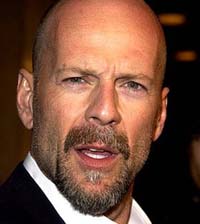 hair fell out. Now when I look in the mirror, I feel younger.
hair fell out. Now when I look in the mirror, I feel younger.
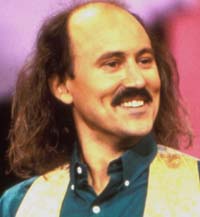 Plus there are many added benefits. Showers now take five minutes. I save a small fortune on shampoo and conditioner and haven’t bought a comb or a hair brush in decades. Getting ready to go to work or out on the town now only takes seconds. It’s harder to get dandruff, and my head is now essentially “lice-proof”. But most important of all, I no longer look like an idiot.
Plus there are many added benefits. Showers now take five minutes. I save a small fortune on shampoo and conditioner and haven’t bought a comb or a hair brush in decades. Getting ready to go to work or out on the town now only takes seconds. It’s harder to get dandruff, and my head is now essentially “lice-proof”. But most important of all, I no longer look like an idiot.
So which guy are you? Are you still clinging to the past, or have you embraced your inner baldness? Whose look do you relate to more, Stephen Gallagher or Bruce Willis? It’s not too late to save yourself. So what are you waiting for, get out those clippers and get busy!
Endless Boogie Rocks the Fillin’ Station – A Little Music for the Soul (Part Two)
Saturday night was the first outing for my new band ‘Endless Boogie’, and fun was had by all who ventured out to party with us at the Fillin’ 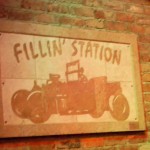 Station in Kingston Springs, TN. The club, owned by Patrick Weickenand, was the perfect setting for my long awaited rock n’ blues experiment. Small, intimate, and loaded with character, the club is housed in an old garage right out of yesteryear, hence the name, and a favorite watering hole for the locals on the west side of town.
Station in Kingston Springs, TN. The club, owned by Patrick Weickenand, was the perfect setting for my long awaited rock n’ blues experiment. Small, intimate, and loaded with character, the club is housed in an old garage right out of yesteryear, hence the name, and a favorite watering hole for the locals on the west side of town.
Our trio started out with a couple of instrumentals to get things going before switching to some vocal-based tunes. The place wasn’t too busy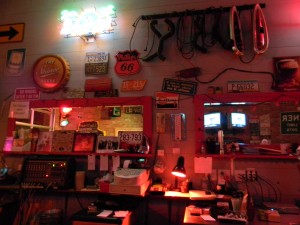 during our first set, so Patrick, who was working the bar, had time to sit in on harp for a few tunes in between slinging beers. Patrick is one of the nicest guys you’ll ever meet, and undoubtedly contributes greatly to the warmth and charm of this unique place. Anyone who has ever played the Fillin’ Station knows that Patrick is a great harp player, and he’s frequently requested to ‘sit-in’ from behind the bar with many a band. So several times throughout this night he joined in for some fun jams (check out the video below).
during our first set, so Patrick, who was working the bar, had time to sit in on harp for a few tunes in between slinging beers. Patrick is one of the nicest guys you’ll ever meet, and undoubtedly contributes greatly to the warmth and charm of this unique place. Anyone who has ever played the Fillin’ Station knows that Patrick is a great harp player, and he’s frequently requested to ‘sit-in’ from behind the bar with many a band. So several times throughout this night he joined in for some fun jams (check out the video below).
Fran Breen (drums) and Mike Chapman (bass), aside from being good friends of mine, are seasoned pros and I was thrilled to have them on the gig. Talk about groove, boy these guys can lay it down! I had an absolute blast playing with them, and we plan to do this on a regular basis, schedules permitting. As of right now our next outing will be Friday, December 3rd back at the Fillin’ Station.
By the third set, the place had erupted into a full-blown dance party which held through to the end. People were even dancing on Whipping Post (if you’ve ever tried to dance to this song you know why this is significant). All in all it was a triumphant beginning to this new project, a project born out of my need for “a little music for the soul”.

